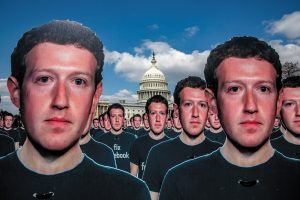Jacob Weisberg in the New York Review of Books:

Facebook is a company that has lost control—not of its business, which has suffered remarkably little from its series of unfortunate events since the 2016 election, but of its consequences. Its old slogan, “Move fast and break things,” was changed a few years ago to the less memorable “Move fast with stable infra.” Around the world, however, Facebook continues to break many things indeed.
In Myanmar, hatred whipped up on Facebook Messenger has driven ethnic cleansing of the Rohingya. In India, false child abduction rumors on Facebook’s WhatsApp service have incited mobs to lynch innocent victims. In the Philippines, Turkey, and other receding democracies, gangs of “patriotic trolls” use Facebook to spread disinformation and terrorize opponents. And in the United States, the platform’s advertising tools remain conduits for subterranean propaganda.
Mark Zuckerberg now spends much of his time apologizing for data breaches, privacy violations, and the manipulation of Facebook users by Russian spies. This is not how it was supposed to be. A decade ago, Zuckerberg and the company’s chief operating officer, Sheryl Sandberg, championed Facebook as an agent of free expression, protest, and positive political change. To drive progress, Zuckerberg always argued, societies would have to get over their hang-ups about privacy, which he described as a dated concept and no longer the social norm.
More here.
